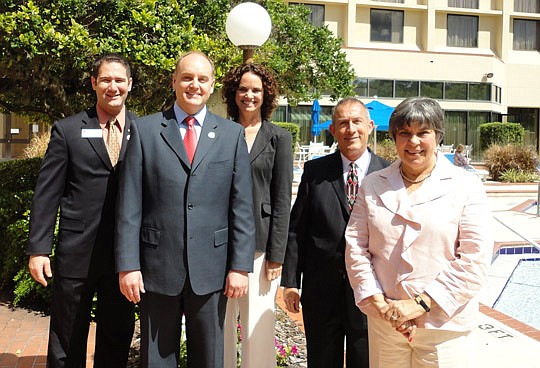
by Michele Gillis, Staff Writer
Despite a brand new crew in Florida’s legislature and an early session, Realtors fared very well in all aspects during the most recent legislative session, says the state’s chief real estate lobbyist.
John Sebree, the Florida Realtors’ vice president of public policy, spoke at the Northeast Florida Association of Realtors’ quarterly meeting last month to give an update on the legislative session and the outcomes.
“In addition to dealing with a $2 billion budget shortfall, legislators had another time-consuming task that happens only once a decade: redraw political boundaries, a process that required the Legislature to convene two months earlier than usual,” said Sebree.
This year, Florida Realtors entered the 2012 session with a modest agenda and optimistic expectations.
“Last year, we took on some big issues including ‘scrapping the cap’ on the Sadowski Housing Trust Funds and passage of a proposed constitutional amendment providing property tax relief for thousands of residential and commercial property owners,” said Sebree. “That will appear as Amendment 4 on the November ballot.”
According to Sebree, of the 1,747 general bills filed this session, fewer than 300 passed both chambers. Among these are several of Florida Realtors’ priority bills dealing with septic tank inspections, local business taxes and Citizens Property Insurance Corporation.
“I am very excited to tell you about a couple of things that happened,” said Sebree. “With redistricting and the budget shortfall, we thought nothing would get done, but that’s not what happened. We got almost 100 percent of everything we asked for.”
Sebree said if we can get this market moving, the legislature won’t be dealing with a $2 million budget shortfall for long.
“You will sell so many houses that so much document stamp revenue will come in that they won’t have a budget shortfall,” he said. “But, until we get there, we have to work on a lot of other issues first.”
Last year there was a large movement to vote “No” on Amendment 4. This year the initiative, Florida Taxpayers First, is to vote “Yes” on Amendment 4 in the November election.
“If approved, it would reduce the yearly assessment cap on non-homesteaded property from 10 to 5 percent,” said Sebree. “It will also provide a tax relief for first-time homebuyers. It would allow the legislature to prohibit local governments from raising property tax assessments when property values decline. It would entitle first time homebuyers and those who haven’t had a homesteaded property for three calendar years to a tax discount of 50 percent of the home’s assessed value not to exceed the median homestead value in the country.”
The first passed bill that Sebree discussed has a direct financial effect on people in the industry.
“The bill exempts real estate sales associates and broker associates from paying local business taxes, formerly known as occupational license fees, if required in their city or county,” said Sebree. “Under Florida law, these individuals must affiliate with a real estate broker who already pays local business taxes. Brokers will continue to pay the tax. Repeal of the tax will save real estate licensees $3.8 million annually. This bill will attract new insurers to Florida and keep existing insurers here.”
Next he discussed the mandatory septic tank inspections out, optional inspections in.
“Septic tank inspections are now optional. We are done talking about septic tanks,” said Sebree.
Other bills that passed allowed a major step toward creating a competitive property insurance market by reducing the amount of money private insurers must give Citizens Property Insurance Corporation.
Another bill introduced to be on the November ballot is a proposed constitutional amendment to increase the exemption for tangible personal property taxes. Under current law, an exemption applies to the first $25,000 in property taxes such as business equipment. If approved by 60 percent of voters in the November election, the exemption would expand to include the value of tangible personal property between $25,000 and $50,000.